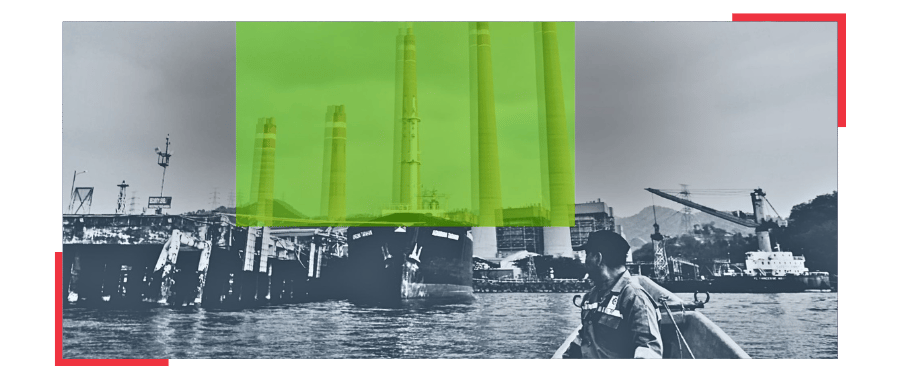
“HMRC must be able to get a firmer grip on the scale of wealth that is currently stashed away offshore.”
Hi {{first_name|there}},
Back in 2022, when Rishi Sunak was prime minister, he joined his Indonesian counterpart at the G20 summit to launch an ambitious project that would move one of the world’s most polluting economies into a clean, green future.
Joining other wealthy nations, the UK pledged £850m of taxpayers’ money to support Indonesia’s Just Energy Transition Partnership (JETP). The project was supposed to phase out coal in the country – which accounts for about a third of its total energy mix. The sense was that this could be big.
And the stakes were certainly high. Indonesia’s coal consumption has more than doubled over the past 10 years and it now ranks eighth in the world for emissions. If the world’s transition to green energy is going to work, it needs to work in places like Indonesia.
Global banks lined up to help raise $10bn (half the overall estimated project cost) to support the Indonesian government. For them it was an opportunity to show what an important role they were playing in reducing carbon emissions. HSBC’s chief executive Noel Quinn hailed the scheme as “further proof that finance has an important role to play in facilitating the changes needed to achieve net zero”.
But when the back-slapping was over and the microphones put away, the big banks started raising money for coal expansion in Indonesia – the very thing JETP was trying to move the country away from. Since the scheme was announced, HSBC, Standard Chartered, Citigroup, Deutsche Bank and Bank of America – all supporters of JETP – have helped to raise almost $2bn for companies involved in coal expansion in Indonesia.
We spoke to Fabby Tumiwa, the executive director at IESR, a thinktank that was part of a JETP technical working group, about this. He said: “If all the same banks that support renewables still finance all the fossil fuel projects, it’s become ineffective. I would like to see them spend their money on renewable energy projects listed in the JETP. There’s still limited financing going to renewable energy projects right now.”
It’s astonishing to see how money rushed to both the big shiny project of the future and the original problem – and how this kept Indonesia trapped in dirty energy.
This story is the latest in our Cop In / Cop Out series uncovering the hypocrisy of the political and business leaders who are assembling in Brazil for the Cop30 summit. We won’t be writing about brash government announcements that are designed to make politicians look good. We’re investigating what’s actually happening on the ground.
So here’s a quick round-up of our Cop investigations so far:
This kind of rigorous, fact-checked journalism is possible because of the generous support from our membership community, the Bureau Insiders. We don’t have corporate backers or take money from the government: our stories are possible because of people like you. If you want to support trustworthy news and help keep governments and businesses honest, then become a member today.
This year’s Cop30 presents an important opportunity for us to hold our governments accountable and urge them to take action, including on protecting Indigenous peoples and the ecosystems we all rely on. But is it all just a talking shop or will it actually make a difference?
Join us on Thursday 13 November at 6pm on Zoom to hear all the behind-the-scenes stories from the team, including Josephine Moulds, Grace Murray and editor Rob Soutar. You’ll have a chance to ask your burning climate questions, so don’t miss out on your free ticket.
Factchecked!
Each week we reveal a fascinating fact from our reporting…
Did you know?
Diethylene glycol, a type of industrial antifreeze toxic to humans, was found in alarmingly high quantities in children’s cough syrup made in India.
Find out more
Our analysis of data from India’s medicine regulators showed that at least 12 cases of substandard cough syrup have been flagged since 2018. The most recent was in May this year.
Over the past three years, the World Health Organization has issued nine warnings about cough syrups contaminated with industrial chemicals. In five cases they were made by Indian manufacturers.
Read more here.
MPs take HMRC to task on our story
TBIJ’s latest investigation prompted a Labour MP to stand up in parliament the next day and demand that HMRC release its official estimate of how much tax is being lost to offshore tax havens.
With the next Budget a couple of weeks away and the government desperately conjuring up schemes to wring a few more pounds out of the UK economy, you’d have thought that ending off-shore tax avoidance schemes would be top priority. Any attempt to tackle the problem has to start with transparency about just how much money is involved.
But HMRC has claimed it simply doesn’t have an estimate for how much money goes wandering off to Jersey, Panama or other tax havens.
Enter TBIJ, and a Freedom of Information request by TaxWatch that was shared with us. Turns out the taxman had all the data it needed to make a pretty good guess.
On Wednesday, Lloyd Hatton, a Labour MP who sits on the Public Accounts Committee, stood up in Parliament during a debate on the UK’s overseas territories and said: “Just yesterday, the Bureau of Investigative Journalism revealed that HMRC is apparently refusing to publish its official estimate of how much tax is currently being lost due to tax dodging facilitated by tax havens. HMRC must be able to get a firmer grip on the scale of wealth that is currently stashed away offshore, and publish its findings openly.”
It’s great to see our work being picked up in Westminster immediately and informing public debate. The government responded boldly – but still left itself plenty of wiggle room. Stephen Doughty, the foreign office minister, said: “The overseas territories will have heard this debate, and the strength of feeling. Our commitment on this issue sits alongside our commitments to the relationship with the overseas territories more broadly, and to tackling corruption and illicit finance globally.”
Well, let’s see it then. The government is holding an anti-corruption summit next spring (I’m looking forward to that already) and we’ve got plenty of investigations in the pipeline that will expose how complicit the UK is in facilitating tax-dodging and grand corruption.
That’s the best way we can keep the heat on the government to actually act.
China and a UK university tried to silence our source
I found out this week that a British university shut down research into alleged human rights abuses after an intimidation campaign from China.
Sheffield Hallam University stopped Laura Murphy, professor of human rights and contemporary slavery, from completing research into allegations that Uyghurs in China’s Xinjiang province were subject to forced labour.
Earlier this year we quoted Murphy in an investigation showing for the first time how 100 global brands – from Apple to Volkswagen – are linked to forced labour in China.
The Chinese government reacted angrily to the story at the time, with a spokesperson for the Chinese embassy in the US saying “allegations of ‘forced labour’ in Xinjiang are nothing but vicious lies concocted by anti-China forces”. Members of all ethnic groups there “enjoy happy and fulfilling lives”, they said, adding that “Xinjiang-related issues are not human rights issues at all, but in essence about countering violent terrorism and separatism”.
Murphy has years of experience researching forced labour and modern slavery at British and American universities and was a senior policy advisor to the Biden administration specifically on monitoring Uyghur forced labour in China. She helped us understand how state coercion in China works, especially when a state official comes knocking on someone’s door and asks them to come and work on the other side of the country. (It may be framed as a question, but they don’t get a choice.)
China waged a campaign of intimidation against Sheffield Hallam – and the university caved, refusing to publish some of Murphy’s work. When the government found out, David Lammy, then foreign secretary, warned his Chinese counterpart that it would not tolerate attempts to suppress academic freedoms at UK universities, according to the BBC.
But China will hardly be deterred when institutions give in under this kind of pressure. Interference with academic freedom, whether through intimidation or secretive funding campaigns, is a worrying reality at British universities now. Bringing these cases out into the open is the only way we push the government to step in and protect academics.
Murphy posted a fairly vague apology from Sheffield Hallam on LinkedIn. “The University would like to apologise for any uncertainty” it began. Another waffly sentence read:
“The University regrets and apologises for some of the communications relating to Professor Murphy’s research, and it has no hesitation about undertaking to uphold and, where required, robustly defend the academic freedom of its staff in accordance with legislation.”
It doesn’t exactly fill you with confidence, does it?
France cracks down on childlike sex dolls – will the UK?
Shein, the fast fashion outlet based in China, is facing proceedings in France for offering childlike sex dolls for sale on its platform. Shein immediately apologised and took down the listings from third-party vendors.
Sound familiar? Yes, we exposed how Facebook was doing something similar very recently. Disturbing childlike sex dolls were being advertised on Facebook. Meta wasn’t selling the dolls itself, but allowing others to do so.
Crown Prosecution Service guidance suggests that someone could be breaking the law by importing or selling (or intending to sell) these items, or by sending them in the post. I wonder whether UK authorities are being as proactive as their French counterparts.
What we’ve been reading
🔴 This deep dive into what happened when Saudi Arabia’s sci-fi city project met the real-world forces of finance and physics ft.com
🔴 A look at the local council pilot schemes aiming to reshape asylum seeker accommodation insidehousing.co.uk
🔴 This piece digs into the data of the relative risks of smoking and vaping – and how public opinion doesn’t quite reflect reality ourworldindata.org
Thanks,
Franz
Franz Wild
CEO & Editor-in-Chief

ADVERTISEMENT
Free, private email that puts your privacy first
A private inbox doesn’t have to come with a price tag—or a catch. Proton Mail’s free plan gives you the privacy and security you expect, without selling your data or showing you ads.
Built by scientists and privacy advocates, Proton Mail uses end-to-end encryption to keep your conversations secure. No scanning. No targeting. No creepy promotions.
With Proton, you’re not the product — you’re in control.
Start for free. Upgrade anytime. Stay private always.






